
By LEE ZHI WEI
A group of young debaters who went off to South Korea for a debating meet did not win any prizes but came back with a wealth of experience.
WORLD Schools Debating what?” That was my response when the World Schools Debating Championship (WSDC) was publicised in our local newspapers in March, and I’m quite sure that most people had a similar reaction.Why? Well, if you don’t know (and you probably don’t), the last time Malaysia participated in WSDC was way back in 1994.
Until four months ago, I did not have any idea that such a competition existed. And, quite frankly, I had absolutely no inkling that I could and eventually would be part of the five-member team that would represent Malaysia in this year’s WSDC in Seoul, South Korea.Team Malaysia members (from second from left) John, Andrew, Zhi Wei, Jian Wei and Mishyan Kumar, together with Mrs Jagjeet Singh, at the airport in Seoul.
Selection of the team began in March.
At the beginning, there were 48 debaters, but the number was quickly reduced to first 24, then 12 and, at the end of April, the final five – apart from me, they were Andrew Wong Yoon Loong, Ang Jian Wei, John Lee and S. Mishyan Kumar.
We are all 18, except for Mishyan Kumar, who is 17.For the next three months, we read, researched and debated under the guidance of our coach, Mrs Jagjeet Singh.
We tried to make our training sessions as extensive and as frequent as possible because we were well aware that 12 weeks was not a lot of time, considering how many teams commence preparations as early as a year before the competition.
The three months passed quickly, if somewhat stressfully. Soon it was time to leave our favourite roti canai and teh tarik behind for the unfamiliar land of fermented cabbage, a.k.a. kimchi. But food was the last thing on our minds – we were about to put our words and wit to the ultimate test against the best of the best in the international debating scene. Needless to say, we were thrilled, nervous and hopeful, all at the same time.
The earlier rounds
We arrived in Seoul on July 2 to discover that the 35 participating countries were from all corners of the world, ranging from Ireland to Indonesia, Kuwait to Korea, and Peru to Pakistan. It was amazing to see how the competition had brought so many people of differing creed and colour together.
The next five days consisted of the eight gruelling preliminary rounds to determine the best 16 which would compete in the octo-finals.over those few days, the four prepared motions debated were:
- This house believes that the development of clean industry should be made a condition for receiving non-emergency aid;
- This house believes that Holocaust denial should be a crime;
- This house believes that the United States should withdraw from their military bases in Asia; and
- This house believes that free trade harms the developing world.
The impromptu motions were equally thought provoking:
- This house would ban the use of models who are below a healthy weight,
- This house believes that governments should not place limits in the areas which scientists may research,
- This house would legalise all drugs, and
- This house would limit media reporting of terrorist atrocities.
The teams we debated against were from the Netherlands, Hong Kong, Romania, Ireland, Peru, Lithuania, Canada and India. Unfortunately, our hopes of qualifying for the octo-finals were crushed. We managed to win two rounds, against the Netherlands and Romania, but we lost the other six, three of which saw split decisions by the adjudicators.
Though disappointed to know that we were out of the race, we did not spend too much time wallowing in self-pity. We could not – the competition was not over yet, so there was still much to be learnt from the next few rounds and the grand final over the next three days.The 16 teams that made it to the octo-finals were Ireland, England, Hong Kong, Australia, Singapore, Scotland, Pakistan, Slovenia, South Africa, Greece, the Philippines, Argentina, Israel, the United States, South Korea and Canada.
We spent those three days watching the debates between different countries, taking down notes and learning from the, by and large, experienced teams. It was interesting to see the diverse debating styles demonstrated by the teams from different countries.
The impromptu motion debated during the elimination rounds were:
- This house would force organisations to place more women in senior positions (octo-finals),
- This house would privatise public utilities companies (quarter-finals), and
- This house would partition Iraq (semi-finals).
The grand final and the results
The two finalists were Scotland and none other than our neighbours, Singapore. The motion up for debate was “This house would abolish the Nuclear Non-Proliferation Treaty”.
Singapore proposed. However, Scotland emerged victorious, winning the votes from all nine adjudicators, in what was described as a “close but clear decision” by one of the co-chief adjudicators, Claire Ryan. Congratulations to the champions of WSDC 2007, Team Scotland!
Other awards were also given that evening.Jamie Susskind (England), Jeremy Rich (Australia) and Kaerlin McCormick (Australia) were named the top three debaters of the tournament.
Meanwhile, Pakistan won the prize for the best team and best debater in the English as a Second Language category. Slovenia did likewise in the English as a Foreign Language category. The English-Speaking Union of Korea also gave a prize for the best speaker from a new team, won by Japan’s Itaru Hiromi.
Last thoughts
On paper, Team Malaysia’s “two wins and six defeats” may come across as an awful performance. Some might think that entering the competition had been a complete waste of time and resources. Some might even be discouraged from participating again next year.
But we beg to differ. There is a need to see beyond what is on paper because, looking back, we see more than “two wins and six defeats”.
We see experience, experience that gives us greater insights into the art of debating that can become the building blocks for a stronger foundation, experience that enables us to work on our flaws more effectively and strengthen our performance, experience that can be turned into success. It is the experience we sorely lack due to our absence from the scene for more than a decade.
We also strongly believe that Malaysia has the potential to produce world-class debaters.Debating is a skill, and like any other skill, it can be honed, sharpened and perfected. In the debating scene, Malaysia is not far off from other countries, and is, in fact, on par with some. With a more consistent involvement and participation in the upcoming competitions, Malaysia’s achievements can and will reach greater heights.
While conceding that we did not perform well this year, we will not accept it as an excuse to hold up our hands and surrender.In the words of Abraham Lincoln, it is not “whether you have failed, but whether you are content with your failure”.
Held since the early 1990s, the championship is a forum for students, aged 14 to 18, to exchange views on international issues. The Malaysian leg this year was jointly organised and sponsored by the English Speaking Union of Malaysia (ESUM) and The Star.
Source:http://thestar.com.my/education/story.asp?file=/2007/8/12/education/18510162


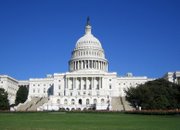

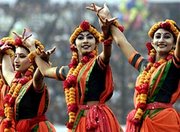


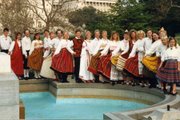

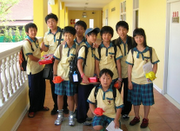

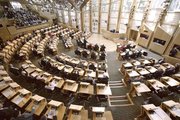


No comments:
Post a Comment